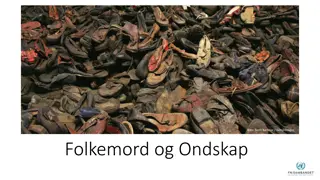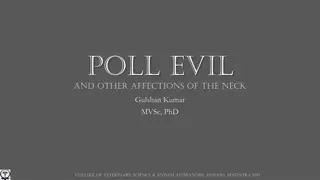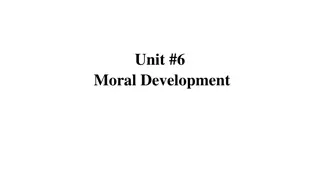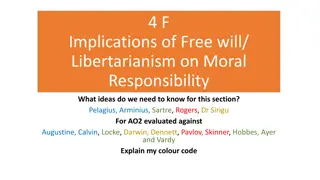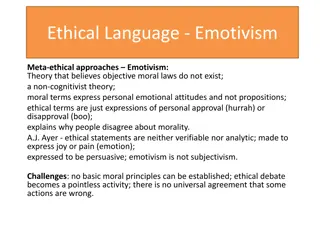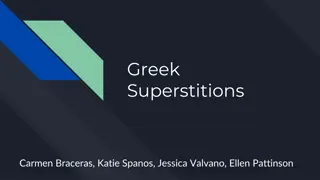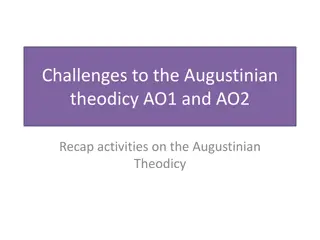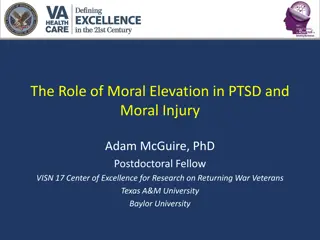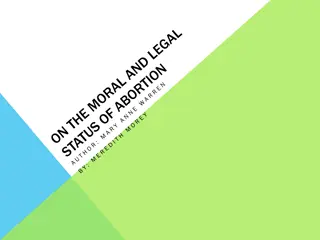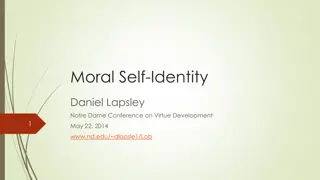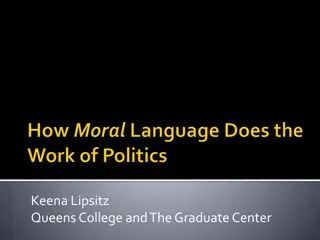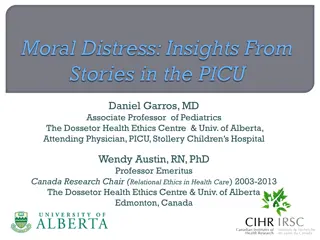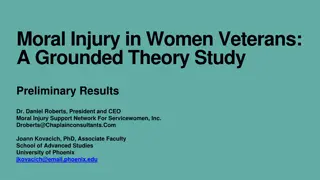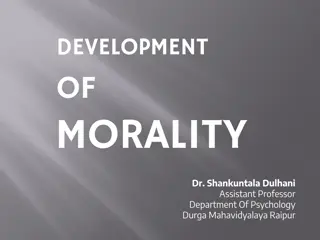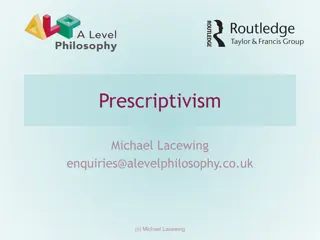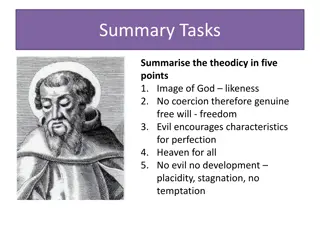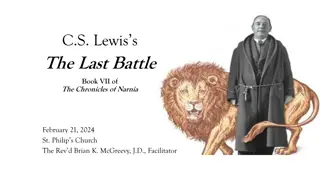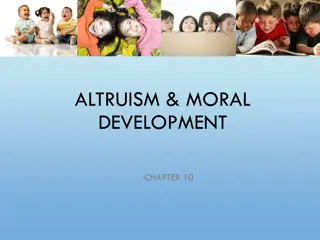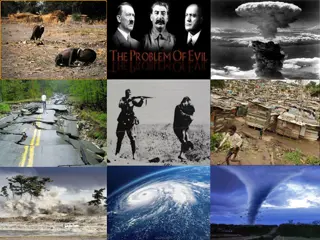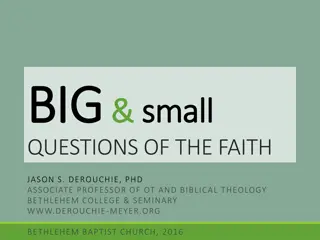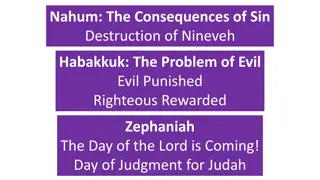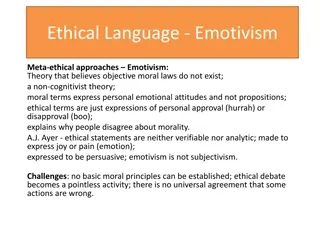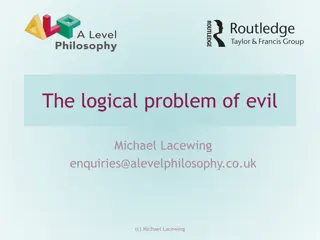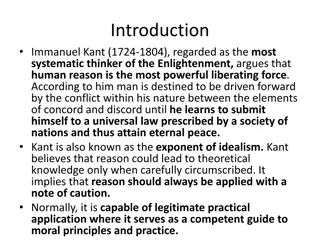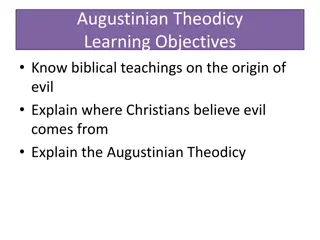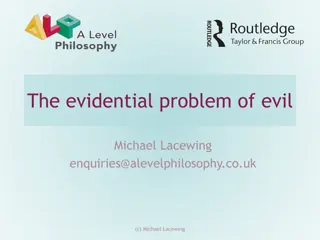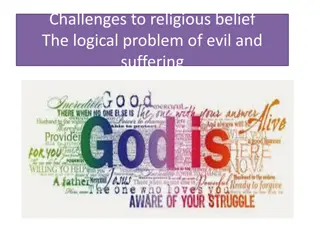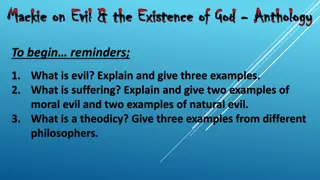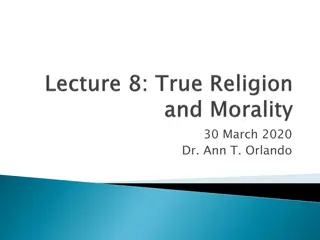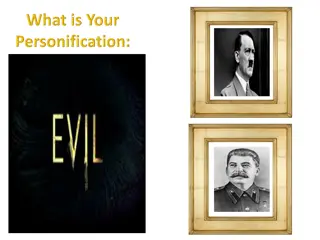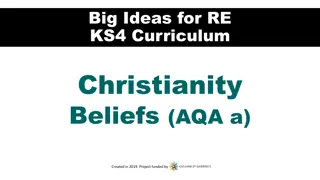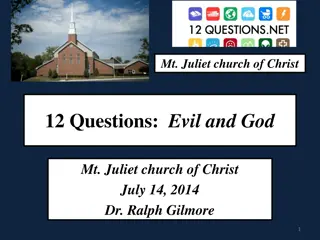Understanding Genocide: Connection Between Ethnic Cleansing and Evil
Explore the concept of genocide, as defined by the UN, through historical events like the Armenian Genocide and the Holocaust. Delve into the depths of evil and its association with acts of genocide within societies, touching upon the banality of evil and the systematic eradication of entire groups.
2 views • 10 slides
Understanding Poll Evil and Yoke Gall in Horses: Symptoms and Treatment
Poll evil and yoke gall are common afflictions affecting horses, particularly in the neck region. Poll evil is an inflammatory condition characterized by a painful swelling at the top of the neck, while yoke gall is localized acute inflammation caused by yoke pressure. Poll evil is typically treated
0 views • 8 slides
Understanding Kohlberg's Stages of Moral Development
Kohlberg's stages of moral development, built upon Piaget's psychological theory, outline six developmental stages of moral reasoning, with each stage offering a higher level of response to moral dilemmas. Kohlberg focused on justice in moral development and emphasized the importance of how individu
0 views • 19 slides
Understanding Moral Development and Moral Reasoning
Moral development involves an individual's sense of right and wrong, influenced by family, school, friends, and societal environment. Children learn moral concepts from interactions with parents, teachers, peers, and society, shaping their understanding of good and bad. Additionally, moral reasoning
0 views • 13 slides
Moral Responsibility and Free Will Implications in a Contemporary Context
This text delves into the implications of free will and libertarianism on moral responsibility, examining the ideas of various philosophers and thinkers such as Pelagius, Arminius, Sartre, and more. It explores the concepts of moral agency, determinism, normative ethics, religious beliefs, and the c
5 views • 12 slides
Understanding Emotivism in Ethical Philosophy
Emotivism is a meta-ethical theory that rejects objective moral laws, instead positing that moral terms express personal emotional attitudes, not universal truths. Influenced by A.J. Ayer and rejecting naturalism, this theory suggests that ethical statements are not objective propositions but rather
0 views • 28 slides
Unveiling Greek Superstitions: Evil Eye, Walking Sign, and Social Context
Greek superstitions are deeply ingrained in the culture, passed down through generations and encompassing beliefs in the Evil Eye and walking sign. The Evil Eye superstition involves protection charms and rituals against malevolent glares, while the walking sign dictates consequences for crossing le
0 views • 12 slides
Challenges and Opportunities of Moral Revolution in Indonesia
The need for a moral revolution in Indonesia to address societal issues like corruption, conflict, and intolerance. Contrasting mental and moral revolutions, the focus is on behavior change to build a humane society with healthy moral values. Initiatives and discussions highlight the urgency of tran
0 views • 13 slides
Challenges to the Augustinian Theodicy: An Evaluation of Key Objections
The Augustinian theodicy, based on the assumptions of a faultless creation and the existence of evil from elsewhere, faces challenges from various angles. Scientific, moral, and theological objections question the validity of the Genesis account, the moral implications of Hell, and the ethical consi
0 views • 19 slides
Understanding Moral Elevation in PTSD and Moral Injury
The research by Dr. Adam McGuire explores the role of moral elevation in PTSD and moral injury, emphasizing how witnessing virtuous behaviors triggers emotional and physical responses leading to a desire for imitating virtuous acts. By integrating prosocial emotions into trauma treatment, the positi
0 views • 13 slides
Understanding Humanity and Moral Community in the Context of Abortion Ethics
Exploring the complex ethical considerations surrounding abortion, this discussion delves into determining the humanity of a being, defining the moral community based on traits of personhood, fetal development, and the right to life. The arguments include the morality of abortion, the definition of
0 views • 9 slides
Challenges to Moral Anti-Realism: Objections and Responses
The article explores objections to moral anti-realism, including moral nihilism, condemning immorality, and the notion of moral progress in the absence of moral reality. It addresses concerns about the justification for interfering with others' behavior, the relationship between moral beliefs and ob
0 views • 6 slides
Understanding Moral Self-Identity Development
Situating moral self-identity within ethical theory and developmental psychology, this overview explores the centrality of morality within the self-concept. It discusses the chronic accessibility of moral schemas, the importance of strong evaluation in moral behavior, and the connection between mora
0 views • 33 slides
Understanding Moral and Constitutional Values in Relation to Judiciary
Explore the concepts of moral values and constitutional values, emphasizing their importance in decision-making processes and societal norms. Discover the stages of moral development and delve into constitutional values such as sovereignty, socialism, secularism, democracy, justice, liberty, equalit
0 views • 9 slides
Analysis of Moral Language in Political Communication
Explore how Republican and Democratic elites use distinctive moral language and its impact on voters in the context of the 2012 election data. Discover the application of Moral Foundations Theory in understanding political differences in the United States and how moral intuitions influence public op
0 views • 13 slides
The Influence of Disgust on Moral Behavior in Psychological Research
Explore the impact of disgust on moral behavior through various studies, including moral dilemmas and criteria for moral judgment. Research delves into how disgust affects decision-making processes related to moral dilemmas and helping behavior. Discover the connection between physical disgust and i
0 views • 16 slides
Understanding Moral Distress in Healthcare
This content discusses the concept of moral distress in healthcare, defined as the pain and anguish experienced when one knows the right thing to do but faces internal or external barriers preventing action. It explores the implications of moral distress on healthcare practitioners and emphasizes th
0 views • 25 slides
Insights on Moral Injury Among Women Veterans: Preliminary Study Findings
Preliminary results from a grounded theory study on moral injury in U.S. women veterans reveal themes such as sexual assault, hostile work environments, and more. Participants shared their experiences, highlighting the nature of moral injury they faced, distinguishing between various forms of discri
0 views • 21 slides
Understanding Moral Development: Insights and Perspectives
Morality is the belief in right behavior accepted by society. It involves moral behavior, feelings, and judgments. Moral development evolves from childhood to adulthood, influenced by experiences and challenges. Freud's id, ego, and superego theory and Skinner's behaviorism contribute to our underst
0 views • 12 slides
Exploring Moral Judgments and Prescriptive Meaning in Ethics
This content delves into non-cognitivism, Hare’s prescriptivism, and moral anti-realism to understand what we do when making moral judgments. It discusses prescriptive meaning, the concept of good, and how moral language guides actions. The objections raised regarding moral language's functions, p
0 views • 9 slides
Revisiting the Irenaean Theodicy
The Irenaean Theodicy presents a unique perspective on the problem of evil, emphasizing qualities such as human likeness to God, free will, and the role of evil in shaping character towards perfection. It posits that suffering contributes to moral and spiritual development, ultimately leading to a p
0 views • 19 slides
Analysis of "The Last Battle" by C.S. Lewis: Chapter 11 Themes and Reflections
In Chapter 11 of "The Last Battle" by C.S. Lewis, the pace quickens as a battle ensues between Tirian, the Narnians, and the forces of evil led by Rishda Tarkaan. Themes of bravery, treachery, the consequences of sowing evil, and the power of fellowship are explored. The chapter delves into the comp
0 views • 15 slides
Understanding Altruism and Moral Development Theories
Explore the components of morality, theories of moral development by prominent psychologists like Piaget and Kohlberg, and the stages of moral development in individuals. Learn about moral affect, reasoning, and behavior as integral aspects shaping one's ethical framework and decision-making process
0 views • 40 slides
Friedrich Nietzsche's Genealogy of Morals: Uncovering the Evolution of Moral Values
Friedrich Nietzsche critiques traditional philosophy for overlooking the historical development of moral concepts. He argues that moral judgments were initially based on strength and power, later evolving into the dichotomy of master and slave morality. By tracing the genealogy of moral terms, Nietz
0 views • 10 slides
Understanding the Problem of Evil and Suffering
Exploring the dual nature of evil (moral and natural) and the challenges it poses to belief in a benevolent deity. It delves into examples of evil and suffering, defines evil and its categories, discusses types of evil (moral and natural), and addresses the concept of natural evil.
0 views • 18 slides
Understanding God's Role in Moral Evil and Sin According to Faith
Exploring the complex relationship between God, moral evil, and sin as portrayed in religious teachings. The discussion delves into whether God's ordination of evil diminishes His glory, clarifying that while God permits sin to occur, He is not the author of sin. Various scriptural references are us
0 views • 33 slides
Reflections on Evil, Justice, and Divine Response in Habakkuk
Explore the themes of evil, justice, and divine intervention as depicted in the books of Nahum, Habakkuk, and Zephaniah. Witness the struggles of the righteous amidst a world plagued by sin and injustice, seeking answers from a God who promises to punish evil, reward the righteous, and establish ult
0 views • 12 slides
Understanding Emotivism: A Non-Cognitivist Theory in Ethics
Emotivism is a meta-ethical theory that posits the absence of objective moral laws, suggesting moral terms express personal emotional attitudes rather than propositions. Influenced by philosophers like A.J. Ayer and Hume, it challenges the existence of basic moral principles and universal agreement
0 views • 23 slides
Exploring the Logical Problem of Evil and Theodicies
The logical problem of evil questions the existence of a supremely good, omnipotent, omniscient God in the face of evil. Two types of evil, moral and natural, are considered. Responses include the free will theodicy and objections regarding choice and free will. Theodicy versus defense is explored a
0 views • 12 slides
Kant's Moral Philosophy: Reason, Freedom, and the State
Immanuel Kant, a prominent Enlightenment thinker, emphasizes the liberating power of human reason in guiding individuals towards moral principles and practices. Kant's moral philosophy centers on treating each person as an end-in-itself, driven by the good will informed by reason. His concept of mor
0 views • 14 slides
Understanding Augustine's Theodicy and the Origin of Evil in Christianity
Augustine's Theodicy is a philosophical attempt to justify God's existence despite the presence of evil in the world, rooted in biblical teachings on the origin of evil and human free will. This theodicy explores how Christians perceive the existence of evil, how it relates to sin and redemption, an
0 views • 16 slides
The Evidential Problem of Evil: A Critical Analysis
This discussion delves into the complex philosophical arguments surrounding the problem of evil, examining how the existence of evil intersects with the traditional attributes of a supreme deity. It explores the logical and evidential dimensions of evil's existence in relation to God's omniscience,
0 views • 16 slides
The Logical Problem of Evil in Religious Belief
The logical problem of evil questions how a God who is omnipotent, omniscient, and omnibenevolent could allow evil and suffering to exist in the world. Epicurus' formulation challenges the traditional views on God's attributes and raises questions about why such suffering exists despite the belief i
0 views • 24 slides
Mackie on Evil & the Existence of God: The Problem of Evil
Mackie, known for defending atheism, argued that the problem of evil challenges monotheistic religions. He critiqued the free will defense, claiming that God's attributes of omniscience, omnipotence, and goodness conflict with the existence of evil. The anthology explores different perspectives on e
0 views • 6 slides
Exploring the Nature of Evil in Philosophy and Religion
Delve into the concept of evil through the lens of philosophy and religion, examining different perspectives on the existence of evil, its relationship with divinity, and its implications for human morality and happiness. From ancient philosophical debates to theological considerations, discover how
0 views • 19 slides
Understanding Evil in the Bible and Society
The Bible depicts evil as originating from the Devil and Satan, with men of the world hating God's light and people in sin. The scriptures warn of growing evil in society, hardened consciences, and the need to stand firm in truth. The changing societal landscape is reflected in discussions on marria
0 views • 7 slides
Understanding the Christian Response to the Problem of Evil
Explore the philosophical problem of evil in relation to belief in God, delve into different Christian responses, such as the theodicies of Irenaeus and Augustine, and consider the implications of evil and suffering on the nature of God in the context of Christian beliefs.
0 views • 6 slides
The Problem of Evil: Exploring Questions on Evil and God
Delve into the complex topic of evil and God through a series of thought-provoking questions and discussions presented by Dr. Ralph Gilmore at Mt. Juliet Church of Christ. Explore the nature of evil, why God allows it, and the theological considerations surrounding this timeless dilemma.
0 views • 17 slides
Exploring Evil in Shakespeare's Macbeth: A Deep Dive
Delve into the depths of evil in Shakespeare's Macbeth as critics analyze the play's exploration of the nature of evil. From supernatural elements to tragic consequences, the discussion uncovers the complexity and darkness that pervades the characters and themes of Macbeth. Discover how the play's p
0 views • 26 slides
Forms of Moral Reasoning and Ethics in Decision-Making
Explore the main forms of moral reasoning in ethical decision-making, including virtue ethics, deontological reasoning, and teleological reasoning. Understand the importance of developing ethical virtues and principles in guiding behavior. Delve into examples of reasoning from virtue and deontologic
0 views • 28 slides
